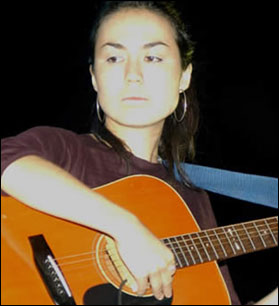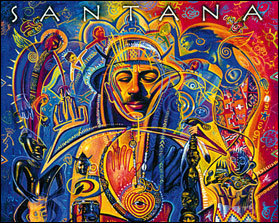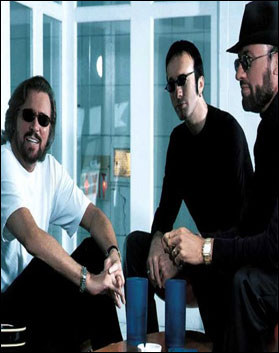|
|
| |
 |
| |
1.
'Extreme Ways' Moby
Moby is easily amongst the last great experimental artistes left
in America. His music is one that cannot be contained in one single
genre. With electronica, techno and ambient rock all playing a huge
part as influences, the DJ/rocker is quite the music wizard. 'Extreme
Ways' which is off Moby's 2002 album 18 is a fabulous track. With
Moby providing somber and somewhat detached vocals to this slightly
tipsy tune and with a powerful wordplay that goes, "Extreme
ways that help me/That help me out at night/Extreme places I had
gone/But never seen any light/Dirty basements, dirty noise/Dirty
places coming through/Extreme worlds alone/Did you ever like it
planned", it makes for a phenomenal song. Even though, 'Extreme
Ways' has always been overshadowed by the more commercially known
track on 18, that is, 'We Are All Made of Stars', but amongst the
fan base of Moby, it is considered a classic. Later on this song
got picked up by Hollywood's Bourne franchise and has been featured
in all three films, helping Moby garner worldwide success. Currently
Moby is working on a new album, slated for a February 2008 release.
But just for now, give 'Extreme Ways' a try. And if you like this,
other fun Moby numbers include 'Lift Me Up' and 'I'm Not Worried
At All'.
|
 |
| |
2.
'Umbrella' Rihanna featuring Jay-Z
Ever since her Pon de Replay arrival in summer 2005, Rihanna has been
ever-present on pop radio. After topping the charts with two killer
dance-pop records, the Barbados singer changed things up with the
hit soul-searching ballad 'Unfaithful'. Her label Def Jam is once
again wasting no time in releasing new material, jumping forward with
new single 'Umbrella'. The song combines Rihanna's serious side with
her dance floor sensibilities to make for her best track yet.
The song's drum kit and driving bass line create an edgy, rock-hop
sound adding immensely to Rihanna's aggressive vocal performance unlike
her past work, where Rihanna's teenage voice carried about as much
charisma as a bowl of water. Her uncanny knack for melody, however,
has been able to make up for any vocal shortcomings.
|
 |
On
'Umbrella', Rihanna is beginning to show major signs of musical
growth as she sports her most impressive and aggressive vocal
performance to date. Her uniquely pronounced 'Umbrella' makes
for a very addictive hook.
It is unique in that it is constructed of a hip-hop beat but
has an edgy rock sound. The song is somewhat stripped-down and
consists mostly of a standard drumbeat up until the chorus.
At the hook, however, Rihanna kicks her vocals up a notch alongside
a roaring bass line. The experience culminates in Rihanna's
catchy, repetitive pronunciation of the song's title.
Although 'Umbrella' kicks off with an unnecessary and somewhat
uninspired rap from label boss Jay-Z, Rihanna more than makes
up for the early misstep as she convincingly sings about keeping
a relationship together no matter the circumstances. If this
lead single is any indication, the upcoming third album, Good
Girl Gone Bad should be her best yet. |
| |
3.
'Karma Chameleon' Culture Club
'Karma Chameleon' is a song from British band Culture Club.
The song spent nine weeks at number one on the U.S. Billboard
Hot 100 in 1984, becoming the group's biggest hit and only
U.S. number-one. The song hit number one in sixteen countries
worldwide. In their home country the single became Culture
Club's second song to top the UK singles chart, staying there
for six weeks, being the biggest selling single of the year.
The 'Karma Chameleon' music video is set in Mississippi in
1870 - it depicts people in colourful costume, including dancers
in "red, gold and green", waiting on a riverbank.
Boy George is dressed in even more colourful and flamboyant
costume and is depicted singing the title song. Throughout
the video, black and white people are depicted singing and
dancing together, a rather unlikely scenario at the time and
place where the video is supposed to be set. A light, springy
number, 'Karma Chameleon' ought to be listened to on lazy
Sundays!
|
 |
| |
4.
'Duvet' Boa
Formed in 1993 in England, this alternative rock band is known
outside the United Kingdom through their one and so far only
hit, 'Duvet'. Featuring sultry singer Jasmine Rodgers on vocals,
Steve Rodgers on guitars, Alex Caird on bass and Lee Sullivan
on drums, Boa is an essentially alternative rock music outfit
that hasn't been able to break out as a massive musical entity
like contemporaries The Corrs, Arctic Monkeys, KT Tunsall or
Amy Winehouse, to name a few.
Even though, musically 'Duvet' isn't very edgy or experimental,
it works effectively because of its desperate vocals and tortuous
wordplay that goes, "And you don't seem the lying kind/A
shame that I can read your mind/And all the things that I read
there/Candle-lit smile that we both share/And you know I don't
mean to hurt you/But you know that it means so much/And you
don't even feel a thing".
|
 |
| Interestingly
enough, Boa signed their first album deal with a Japanese record
label called Polystar and their debut album, Race of a Thousand
Camels, was only released in Japan. 'Duvet' was then featured
in an anime series and won this band limited international popularity.
It was in 2001 with Twilight, their first album release in US
through which Boa rose to some success. 'Duvet' was also featured
on this album. Boa went onto release another album, Get There,
in 2005 and is currently working on some material but the release
remains unknown. For now, give this British rocking band a chance.
They really deserve it! |
| |
5.
'A Saucerful of Secrets' Pink Floyd
'A Saucerful of Secrets' is a multi-part instrumental by the
king psychedelic band Pink Floyd from an album of the same name,
released in 1968. The track lasts almost 12 minutes and was
composed by band members Roger Waters, Rick Wright, Nick Mason,
and David Gilmour. It is very much an experimental, avant-garde
piece featuring howling feedback, menacing percussion, and wordless
vocals.
'A Saucerful of Secrets' (originally known as 'The Massed Gadgets
of Hercules' in its earliest performances) became a Pink Floyd
live staple from 1968 until 1972.
Roger Waters once stated in a Rolling Stone interview that this
song was about a battle and the aftermath. Eerie, psychedelic
and so-very Pink Floyd – 'A Saucerful of Secrets' should
best be kept for dark days…quite a number.
|
 |
| |
6.
'Evil ways' Santana
'Evil Ways' is a song by Santana from their 1969 album Santana.
It's about a girl who is spiteful. "You've got to change
your evil ways, baby/Before I stop lovin' you." She makes
her boyfriend jealous by hanging out with her friends. "You
hangin' 'round, baby/With Jean and Joan and-a who-knows-who."
She is constantly letting him down. The middle section includes
a Hammond organ solo while the outro section, where everything
speeds up, includes a 90-second guitar solo performed by Carlos
Santana. Some organs accompany his guitar until it fades out.
Released as a single in early 1970, it became the band's first
top forty and top ten hit in the U.S. peaking at number nine
on the Billboard Pop Singles chart. Download it now.
|
 |
| |
7.
'Jive Talkin' Bee Gees
'Jive Talkin' was a song by the Bee Gees, which hit number one
on the Billboard Hot 100 and reached the top-five on the UK
singles chart in the summer of 1975. Largely recognized as the
group's "comeback" song, it was their first U.S. top
ten hit since 'How Can You Mend a Broken Heart' in 1971.
The song was originally called 'Drive Talking'. Producer Arif
Mardin wished to market the song toward the teen market, and
suggested the change to Jive Talkin (the phrase "jive talkin'",
slang for "telling lies", was a popular colloquialism
at the time). The
pop-oriented sound was a departure from the contemporary ballads
the Bee Gees had become known for. With the new sound, the
public had gained a newfound interest in the Bee Gees and
their music. The single sold over a million copies in the
US alone. While not a top seller in the UK, it did mark the
first time in three years that a Bee Gees single had charted
there. The song is one of those early dance hits that is reminiscent
of the big hair, discotheques and 'grooviness' of the '70s.
|
 |
| |
|
|

